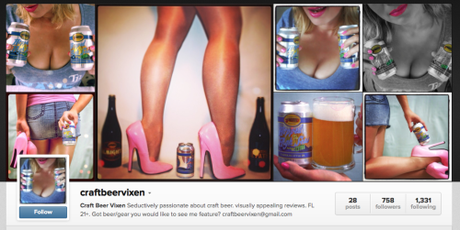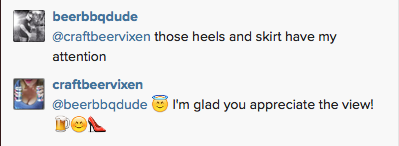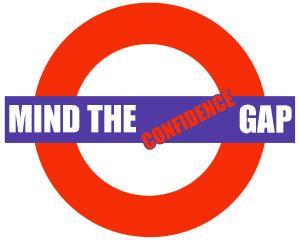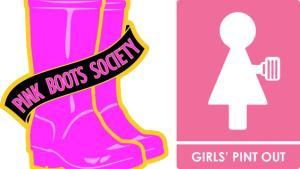I had planned for my last post on this topic to be the end of this series of posts, but then this happened:

Meet CraftBeerVixen. She started following me on Instagram after joining the platform two weeks ago. In that time, she’s amassed over 750 followers thanks to heavy use of hashtags and … her breasts. Or legs. Or butt.

There is no problem with a woman embracing her sexuality, but putting it into the context of the conversation I was hoping to have over the last couple weeks, I wondered: is this a good thing?
So I felt I couldn’t simply leave things where they were and wanted to offer one last round-up of thoughts on the topic of gender and beer … for now.
To be fair, I did reach out to Vixen on her Instagram page and asked her: are you trying to spur conversation about craft beer or your body?
An honest answer? A little of both. Beer and boobs have gone together since the beer girls of Munich, even earlier! And I won’t lie… I like the attention. BUT…I will continue to try and provide a detailed, quality review and my perspective on each beer I try, in addition to a the “visual” additions. I welcome any conversations on the review photos (just the beer pics, not me in them!). And if I can make some friends, some trades, and learn more about this great interest we all have… even better!
I don’t think Vixen is trying to do any harm – it’s clear she has fun with her photoshoots – but it does fit into the bigger picture. If sexuality is the gateway for conversation, it potentially stands to reinforce all the norms previously discussed, whether it’s men’s expectations of women or women’s expectations of themselves.
In her post “What Does It Mean to Drink Like a Woman?,” Shanna Farrell explores the gender gap in regard to bartending and who drinks what kind of cocktail. Even though women represent the fastest-growing segment of worldwide whiskey consumers, they still face an uphill battle to be taken seriously in bars, where drinks like The Pink Lady, Lemon Drop and Cosmopolitan were specifically created for women because, in cultural terms, they’re not supposed to be able to handle liquor.
The ways in which certain cocktails have been perceived, discussed and used as marketing tools reify the ideas about how women drink. They’ve since been embedded in our collective cultural consciousness along with ideas about women in the profession of bartending.
Which I think can also be translated to beer culture, or even our broader American psyche.
 As Heather Vandenengel mentioned in my last post on gender, one of the greatest issues she sees facing women is a confidence gap. From early ages, females are taught that perfection is key and taking risks is problematic.
As Heather Vandenengel mentioned in my last post on gender, one of the greatest issues she sees facing women is a confidence gap. From early ages, females are taught that perfection is key and taking risks is problematic.
In a timely bit of writing, journalists Katty Kay and Claire Shipman offer a slew of evidence for this in their aptly titled piece, The Confidence Gap. They cite a variety of studies, including their own, but I was particularly taken by two points.
The first was research out of University of California-Berkeley, in which it was shown that people who exude confidence within a group, even if they’re less competent than everyone else, will rise to the top of that social circle. This is troubling for women, said Katty Kay in an accompanying interview.
“If perfect is your standard, you’re never going to get there,” she said of women’s expectations. “Of course you’re never growing confident because you’ve set your bar way too high … and you’re conscious of the gap between you and what you’ve aspired to be.”
Kay and Shipman continue, in the written piece:
…the natural result of low confidence is inaction. When women don’t act, when we hesitate because we aren’t sure, we hold ourselves back. But when we do act, even if it’s because we’re forced to, we perform just as well as men do.
Which brings us back to a cycle of problems when it comes to gender and beer.
We’ve seen that there’s a natural inclination to belittle women’s taste to something stereotypical like fruit or sweetened beers, even if the variety of brews available today is nothing short of astounding. Part of that problem falls on our societal expectations. If we teach females to start from a place where they aren’t supposed to question established norms (or like whatever they like to drink), they will expect to not be accepted within male-dominated groups. Like our beer culture.
If we keep adhering to long-standing rules about each gender’s place in regard beer, what good are we doing? Certainly, the craft beer industry and overall marketing efforts have shifted to be more welcoming, but is that enough?
Attitudes toward women are changing, and for the better, but a host of troubling research shows that they can still pay a heavier social and even professional penalty than men do for acting in a way that’s seen as aggressive.
So now here I am, questioning myself. I know I have no reason to be upset with CraftBeerVixen’s Instagram feed, but why do I feel slighted by it? I imagine because I hold beer and its culture so close to my heart and I’ll be damned if someone wants embrace old-fashioned expectations established for women by men.

Groups working to empower beer-loving women
In my eyes, it’s a disservice for an industry that’s modernizing in all sorts of ways, including working to dispel stereotypes through organizations like Girls’ Pint Out or the Pink Boots Society. You don’t have to be sexy or shortchange yourself in order to get involved anymore. Everyone can have a voice.
But is it so bad, really? Is Vixen’s aggression to use sexuality as a conduit for craft beer wholly unacceptable? I don’t know. I’m coming from my own biases, imparted by years of societal nurturing.
What I do know is that we’re in a better place overall if Vixen feels empowered enough to take this route, no matter what I think. I just hope she doesn’t hurt herself – or the culture – by walking in those eight-inch heels.
Related “Gender and Beer” posts:
- Why Do We Think Men Are from Ales, Women Are from Lagers?
- Changing Our Expectations of Women
- Do We Need Saving?
+Bryan Roth
“Don’t drink to get drunk. Drink to enjoy life.” — Jack Kerouac

